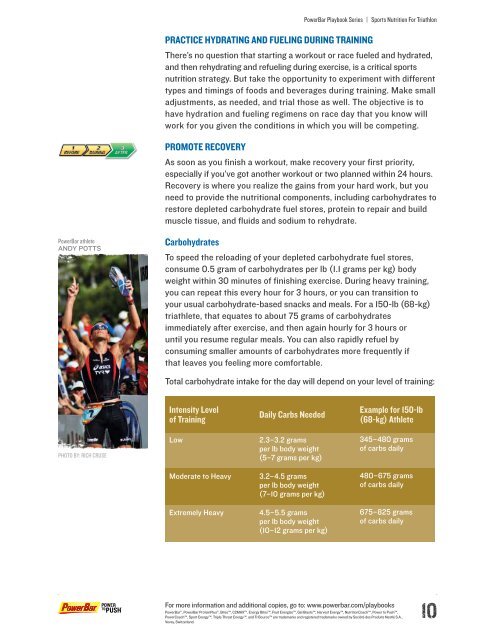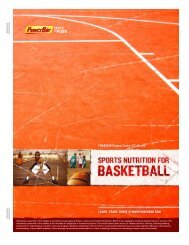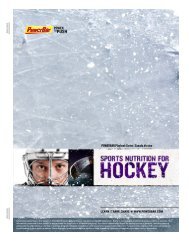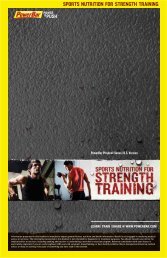PowerBar Playbook Series | Canadian Version - PowerBar.Com
PowerBar Playbook Series | Canadian Version - PowerBar.Com
PowerBar Playbook Series | Canadian Version - PowerBar.Com
You also want an ePaper? Increase the reach of your titles
YUMPU automatically turns print PDFs into web optimized ePapers that Google loves.
<strong>PowerBar</strong> <strong>Playbook</strong> <strong>Series</strong> | Sports Nutrition For Triathlon<br />
PRACTICE HYDRATING AND FUELING DURING TRAINING<br />
There’s no question that starting a workout or race fueled and hydrated,<br />
and then rehydrating and refueling during exercise, is a critical sports<br />
nutrition strategy. But take the opportunity to experiment with different<br />
types and timings of foods and beverages during training. Make small<br />
adjustments, as needed, and trial those as well. The objective is to<br />
have hydration and fueling regimens on race day that you know will<br />
work for you given the conditions in which you will be competing.<br />
PROMOTE RECOVERY<br />
As soon as you finish a workout, make recovery your first priority,<br />
especially if you’ve got another workout or two planned within 24 hours.<br />
Recovery is where you realize the gains from your hard work, but you<br />
need to provide the nutritional components, including carbohydrates to<br />
restore depleted carbohydrate fuel stores, protein to repair and build<br />
muscle tissue, and fluids and sodium to rehydrate.<br />
<strong>PowerBar</strong> athlete<br />
ANDY POTTS<br />
Carbohydrates<br />
To speed the reloading of your depleted carbohydrate fuel stores,<br />
consume 0.5 gram of carbohydrates per lb (1.1 grams per kg) body<br />
weight within 30 minutes of finishing exercise. During heavy training,<br />
you can repeat this every hour for 3 hours, or you can transition to<br />
your usual carbohydrate-based snacks and meals. For a 150-lb (68-kg)<br />
triathlete, that equates to about 75 grams of carbohydrates<br />
immediately after exercise, and then again hourly for 3 hours or<br />
until you resume regular meals. You can also rapidly refuel by<br />
consuming smaller amounts of carbohydrates more frequently if<br />
that leaves you feeling more comfortable.<br />
Total carbohydrate intake for the day will depend on your level of training:<br />
Intensity Level<br />
of Training<br />
Daily Carbs Needed<br />
Example for 150-lb<br />
(68-kg) Athlete<br />
PHOTO BY: RICH CRUSE<br />
Low<br />
2.3–3.2 grams<br />
per lb body weight<br />
(5–7 grams per kg)<br />
345–480 grams<br />
of carbs daily<br />
Moderate to Heavy<br />
3.2–4.5 grams<br />
per lb body weight<br />
(7–10 grams per kg)<br />
480–675 grams<br />
of carbs daily<br />
Extremely Heavy<br />
4.5–5.5 grams<br />
per lb body weight<br />
(10–12 grams per kg)<br />
675–825 grams<br />
of carbs daily<br />
For more information and additional copies, go to: www.powerbar.com/playbooks<br />
<strong>PowerBar</strong> ® , <strong>PowerBar</strong> ProteinPlus ® , Bites, C2MAX, Energy Bites, Fruit Energize, Gel Blasts, Harvest Energy, NutritionCoach, Power to Push,<br />
PowerCoach, Sport Energy, Triple Threat Energy, and TriSource are trademarks and registered trademarks owned by Société des Produits Nestlé S.A.,<br />
Vevey, Switzerland.<br />
10







